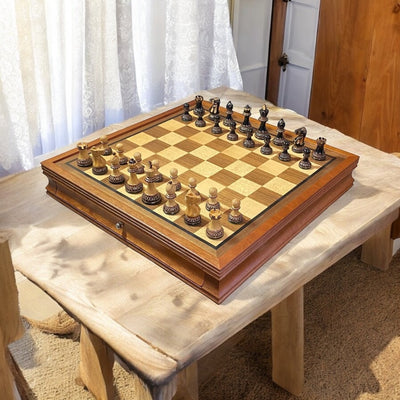The Psychology of Chess: Mind Games on the Board
Chess is much more than just 64 squares and 32 pieces; it’s a battle of wits, a test of strategy, and a fascinating dive into human psychology. The game has captivated minds for centuries, but what keeps players, both casual and competitive, returning to the board? In this article, we will explore the intricate relationship between chess and psychology, shedding light on the mental strategies that can turn an average player into a formidable opponent while also celebrating the elegance of padauk chess pieces that adorn gameplay.
The Mind Behind the Moves
At its core, chess is a psychological duel. Each player must not only focus on their own strategy but also anticipate their opponent's responses. Understanding the psychological aspects of chess can lead to significant improvements in game performance. Here are some critical psychological elements at play:
Anticipation and Planning
The ability to anticipate an opponent’s moves is crucial in chess. Players must not only think a few moves ahead but also prepare for counter-moves. This anticipatory gameplay creates a layer of mental warfare where each decision can trickle down into various outcomes. The cushioning elegance of padauk chess pieces can be a soothing reminder of the beauty of the game amidst this cerebral challenge.
Simultaneously Outmaneuvering and Overlapping Strategies
In chess, players can choose from a variety of strategies: aggressive tactics, defensive maneuvers, or a balanced approach that blends both. The decision to switch between different strategies can throw an opponent off balance. Using padauk chess pieces adds a tactile dimension, appealing to the senses while one maneuvers through their mental game.
Reading Your Opponent
Another psychological aspect centers on reading your opponent. Experienced players can pick up on subtle cues—body language, the timing of moves, and even the way pieces are handled. This skill often differentiates a master from a novice, as good players can exploit psychological weaknesses. Arm yourself with the charm and elegance of padauk chess pieces to maintain an air of confidence during the game.
The Importance of Mindset
The mindset a player adopts significantly affects their performance on the chessboard. Whether you are entering a friendly match or a high-stakes tournament, maintaining the right mental attitude can provide a distinct edge.
Confidence vs. Overconfidence
Chess players often grapple with the fine line between confidence and overconfidence. While a self-assured mindset can boost performance, overconfidence may lead to careless mistakes. Learning to balance this psychological tightrope is key. Choosing the aesthetically pleasing and intricate padauk chess pieces can serve as a reminder of the game’s complexities, encouraging players to center their thoughts and avoid underestimating their opponents.
Emotional Control
Emotions can sway chess decisions significantly. Frustration from a poor move or excitement from a brilliant tactic can cloud judgment. The best players know how to manage their feelings, remaining calm and collected as they navigate the game. This emotional steadiness is something every aspiring player should practice—preferably with a set of exquisite padauk chess pieces to help focus and ground them during tense moments.
The Role of Patience
Chess often requires soaring patience. Rushing a decision can lead to regrettable blunders, making it essential to take time on complex moves. This patience extends beyond merely waiting; it’s about thoughtfully considering possibilities while keeping an open mind to new strategies. A beautiful game played on stunning padauk chess pieces can make each moment feel rewarding and worthwhile.
Mindfulness in Chess
Mindfulness is a powerful technique that can aid chess players in maintaining focus on the present moment. By practicing mindfulness, players can reduce anxiety about the outcome of the game and concentrate instead on their current position and potential moves. A beautiful chess set featuring padauk chess pieces can enhance this mindfulness experience, making each move feel deliberate and spectacular.
The Community Aspect of Chess
Chess is often seen as a solo endeavor. However, the social and community aspects are just as vital. Engaging with fellow players not only enhances strategic understanding but also fosters a sense of belonging. This social interaction allows players to share tactics, discuss games, and form friendships—contributing positively to overall mental health.
Learning Through Competition
Friendly matches and organized tournaments provide excellent opportunities for players to develop and refine their skills. Each game offers the chance to learn valuable lessons about strategy, emotional control, and psychological adaptability. When playing with beautiful padauk chess pieces, the game itself becomes a joy, further enhancing the learning process.
Mastering Chess Psychology: Strategies for Success
To truly become a master at the psychological game of chess, here are some effective strategies:
- Practice Visualization: Regularly visualize potential game scenarios and outcomes.
- Analyze Past Games: Look back at previous games, identifying psychological errors and strategic oversights.
- Watch Competitors: Study games played by skilled players to see how they handle pressure situations.
- Maintain a Balanced Lifestyle: Pay attention to physical health, as it greatly influences mental acuity.
- Incorporate Mind Games: Use deliberate distractions or strategies to throw your opponent off balance.
Each of these strategies can help improve your mental game and lead to more thoughtful, rewarding gameplay.
The Beauty of Chess Sets and Their Impact on Gameplay
The design and material of a chess set can significantly influence a player's experience. For example, padauk chess pieces, known for their rich color and smooth finish, provide both aesthetic pleasure and tactile satisfaction. Owning a set that feels good to use can enhance your overall enjoyment of the game. Players are more likely to focus on their strategy when they are engaged with beautiful and well-crafted pieces.
The Moody Atmosphere of Chess
Chess has a unique ability to adapt to various settings, creating different atmospheres based on the players’ preferences. The mood can shift from competitive and intense to casual and friendly. The elegance of padauk chess pieces marries well with the ambience, enriching the atmosphere, whether it be at a local chess club or a cozy corner of your home.
Staying Consistent: Commitment to Improvement
One of the biggest challenges chess players face is staying consistent in their practice. It is easy to lose motivation or divert focus. Setting specific goals—be it improving one’s opening repertoire, enhancing endgame strategies, or refining psychological tactics—can help maintain that spark. The allure of breathtaking padauk chess pieces can also help inspire players to stay committed to their craft.
Setting Realistic and Achievable Goals
As you navigate your journey in chess, it’s essential to establish achievable goals. Instead of overwhelming yourself with grand ambitions, focus on quantifiable milestones. Assess your game regularly and celebrate your progress, whether big or small—it will motivate you to keep pushing forward. The satisfaction of a well-earned victory can feel even more rewarding when playing with a captivating set of padauk chess pieces.
Beyond the Board: Life Lessons from Chess
The lessons learned from chess extend far beyond the board. The skills of critical thinking, problem-solving, and strategizing are applicable in everyday life. The mental flexibility developed through the game can enhance decision-making and increase resilience in facing challenges.
Translating Chess Skills to Daily Life
Players often find that the patience required for chess enhances their ability to navigate complex situations in real life. Similarly, the need for strategy in chess can improve long-term planning skills. Embracing the psychological journey of chess can lead to personal and professional growth in more ways than one, mirrored beautifully by the artistry of padauk chess pieces.
Advancing Your Chess Game: A Journey Without End
The journey of improving one’s chess game is ongoing, filled with challenges, triumphs, and what-ifs. Players can embody the psychological principles discussed to navigate the complexities of the game masterfully. The elegance of padauk chess pieces serves not only as a physical touchstone but also as a symbol of growth, strategy, and the joy of this timeless game.
Whether you are a seasoned player or a newbie curious about the game, remember that chess isn’t just about winning; it's about the journey of growth, learning, and the rich mental landscape that comes with each move. Keep pushing your boundaries, and let the dance of minds continue on the checkered battlefield!









